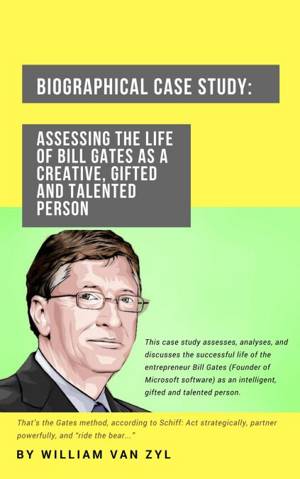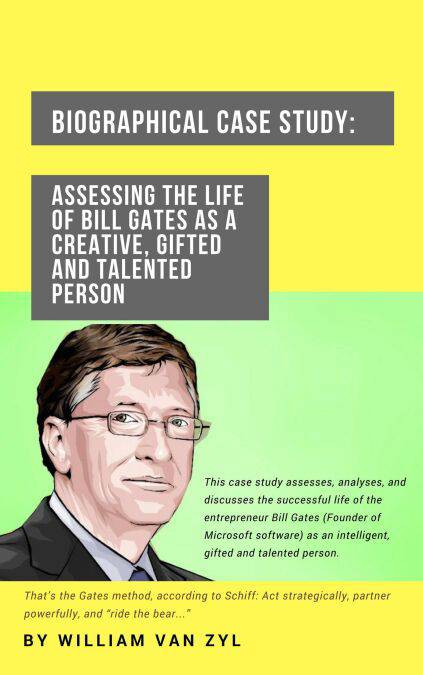
- Retrait gratuit dans votre magasin Club
- 7.000.000 titres dans notre catalogue
- Payer en toute sécurité
- Toujours un magasin près de chez vous
- Retrait gratuit dans votre magasin Club
- 7.000.0000 titres dans notre catalogue
- Payer en toute sécurité
- Toujours un magasin près de chez vous
Biographical Case Study: Assessing the Life of Bill Gates as a Creative, Gifted, and Talented Person. EBOOK
William Van ZylDescription
ESSAY: The focus of this essay is on Bill Gates as a creative, gifted and talented person (business & entrepreneurship). An easy and very interesting read.
SEATTLE - If you spend time with the Gates family it is most probable that someone will mention the "water incident". The future software guru was a headstrong 12-year-old and was having a particularly nasty argument with his mother at the dinner table. His father lost his cool and threw a glass of cold water in the boy's face. The young boy snapped back with something like this: "Hey thanks for the shower!" (Guth, 2009)
Behind the Bill Gates, a success story, is the other William Gates (Sr.), his father. It is the story of his father about the young Gates junior's early years and the raising of Bill (Jr.) that generates interest by almost everyone. Questions like: 'How did he grow up?'; 'What was his life like as a child in the Gates household?', and 'What was he like in senior high school?' In this case study, I will look primarily at "Raising the young Gates" and I will endeavor to identify patterns and traits of giftedness, talent, and creativity which could be linked to the work of Renzulli (1986), Simonton (2000), Sternberg (2006), and Csikszentmihalyi (1999a). In the second section, I will look at some influences, time frames, historical, political, economic and social events that shaped the wealthy and very successful Bill Gates (Jr.) to become one of the wealthiest men and most influential men in the world
Executive Summary
This case study assesses, analyses, and discusses the prosperous life of the entrepreneur Bill Gates (Founder of Microsoft software) as an intelligent, gifted and talented person. The work of Simonton (2000), Sternberg (2006), Renzulli (1986) Csikszentmihalyi (1999a), on talented and gifted persons, shows that Bill Gates fits into three of the four categories outlined by Riley et al. (2004) Ministry of Education (New Zealand), namely:
1. Intellectual/Academic refers to students with exceptional abilities in one or more of the learning areas (i.e., English, the arts, health and physical education, learning languages, mathematics and statistics, science, social sciences, and technology).
2. Creativity refers to students with general creative abilities as evidenced in their abilities to problem-find and problem-solve, and their innovative thinking and productivity.
3. Social/Leadership refers to students with interpersonal and intra-personal abilities and qualities, which enable them to act in leadership roles.
Spécifications
Parties prenantes
- Auteur(s) :
- Editeur:
Contenu
- Langue:
- Anglais
Caractéristiques
- EAN:
- 9780473438357
- Date de parution :
- 16-05-18
- Format:
- Ebook
- Protection digitale:
- /
- Format numérique:
- ePub

Les avis
Nous publions uniquement les avis qui respectent les conditions requises. Consultez nos conditions pour les avis.






